What are the 10 best foods for runners? That of course is a list that is far more expansive than 10, but if you want some ideas for what to eat after a run to help improve your recovery, we’ve got you covered. As a long time running coach, I still reached out to a registered dietitian to validate these choices for us!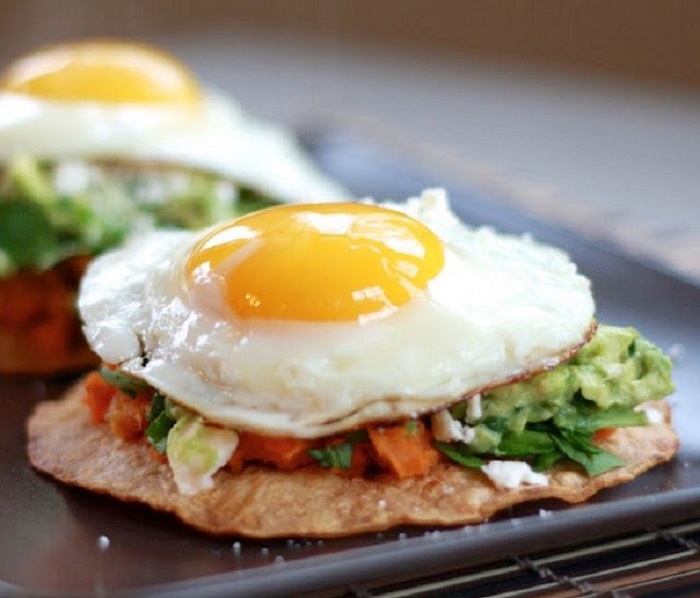
Have you ever gotten home from a casual training run or finished a race and felt like you should eat something but you didn’t know what?
Or maybe you’ve noticed that you’re not all that hungry after running, only to find yourself starving later on and just grabbing whatever is quick and easy even if it’s not all that nutritious.
Both of these scenarios are incredibly common for runners. It can be hard to know what to eat after a workout, run, or race to ensure you can recover and hit the roads again all while feeling your best.
If you’re looking for some ideas on what to eat and when after a tough workout, you’re in the right place. Keep reading to learn more about why it’s important to prioritize refueling, the ideal time frame to refuel within, and the best foods you can eat to ensure you recover, refuel, and are ready to hit the roads again soon!
How Can Runner Recover Faster? Eat After a Run
Recovery is more than just rest; it is a comprehensive process that involves restoring glycogen stores, repairing muscle damage, and replenishing essential nutrients. Nutrition plays a central role in this recuperative journey, providing the building blocks necessary for the body to bounce back from the rigors of running.
We all know it’s important to fuel before and during runs, especially if we’re running long. But we’re not always so good about refueling post-run, which is equally important to our overall training.
According to Lydia Nader, a Registered Dietitian and Sports Nutritionist, we really need to prioritize post-run nutrition.
“After a long run or run workout, the body is primed to replenish the glycogen stores immediately due to your body being more sensitive to insulin, thus you carry glucose better through the blood to the muscles,” said Nader. “This also helps with getting protein to the muscle for repairing the tears in the muscles from a workout.”
Runs, especially those long runs, can leave our muscles depleted of glycogen and other nutrients and our bodies dehydrated and running low on electrolytes and other minerals due to sweating. It also causes microtears that our body has to repair.
Our bodies can only repair and replenish efficiently if we feed it appropriately and in a timely manner.
Does Timing Matter for Recovery Meals
Speaking of timing, does it really matter when we eat after a run?
Absolutely.
The tricky thing is we’re sometimes just not hungry right away. Have you ever walked into the runner recovery area of a race and looked at all the snacks and thought you should grab them but you just didn’t feel like eating? That’s normal and don’t worry, there are ways to deal with that.
But back to the timing, it’s important to try to start replenishing lost nutrients within 30-45 minutes post run. While immediately would be ideal, you’ll still reap the benefits if you can manage to eat within that 30-45 minute timeframe.
Not hungry? Nader has some good suggestions on how to handle that.
Nader said, “I recommend using a liquid or softer foods to refuel, such as a protein shake, smoothie, yogurt or recovery powders from endurance focused brands.”
Liquid calories may be easier to take in than more solid foods. The good thing is there are a lot of liquid options, such as the ones mentioned by Nader, that make it easy to consume the important macronutrients: protein, carbohydrates, and fats.
What Types of Food Should You Prioritize After a Run
So we’ve talked about why you should eat after a run, when, and now it’s the types of foods you should consider.
Refueling with foods that help replenish what we’ve used should be the priority. We’re talking protein, carbs, and fats, as well as things like vitamins, minerals, and electrolytes. But let’s focus on the first three.
Nader recommends prioritizing protein first and carbohydrates second. “Start with 20-30 grams of protein within 30-45 minutes post workout and then 60-90 grams of carbohydrates either with that protein or within 60-90 minutes post-run.”
Carbohydrates serve as the primary energy source during exercise, and replenishing glycogen stores is vital for sustained performance. Protein, on the other hand, aids in repairing the micro-damage that occurs in muscles during running. Striking the right balance between the two not only supports recovery but also sets the stage for improved endurance and reduced risk of injury.
This mix still gets the 2:1 ratio recommended for recovery, but focuses on the protein, which digests slower than carbohydrates.
If you’re wondering how on earth to get protein in that soon after a run if you’re one of those runners who isn’t hungry, this is where the liquid options mentioned earlier can make that easy. Protein shakes or smoothies and chocolate milk are great options to help you hit the protein goal.
10 Best Foods to Eat After a Run
There really are an endless number of foods and combinations of foods you could eat after a run to help replenish and refuel your muscles. So this is, of course, not an all-encompassing list. This should just help give you ideas of some of the best foods to have on hand to make the most beneficial and nutritious choices.
You may not like everything on this list and that’s ok!
For some we’ve provided alternatives that offer similar benefits or ideas for a snack or meal that incorporates a particular item. Hopefully this takes the guesswork out of your post-run meal.
#1 Greek Yogurt
A really easy option to have on hand in your fridge is greek yogurt. And we’re not just talking plain greek yogurt, although that’s always a great option if you enjoy it.
Greek yogurt is a dairy product so it’s a great source of calcium, but also and most importantly, it can have a lot of protein. Most brands offer at least 12-13 grams in a serving, but some brands offer upwards of 20-25 grams in a single 8 oz container.
You could also incorporate greek yogurt into smoothies. It’s a great way to use plain greek yogurt, or consider adding granola, nuts, or berries to the yogurt to start getting some carbs and fats back in your body too.
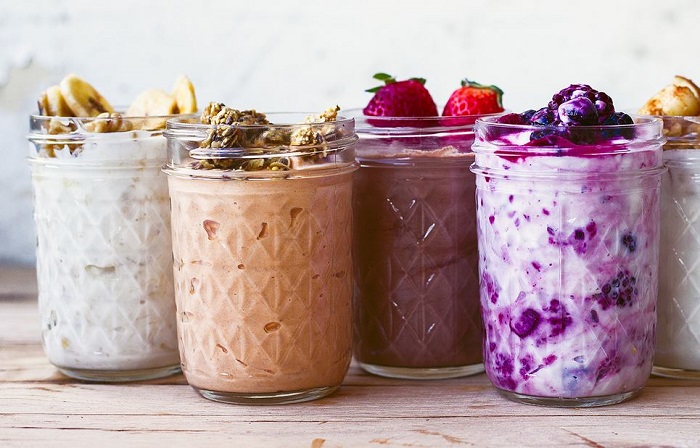
#2 Chocolate Milk
Chocolate milk has grown in popularity for post-race refueling. We’re seeing the option offered in post-race runner recovery tents more and more.
With chocolate milk, you’re looking at at least 8 grams of protein in a serving, as well as carbohydrates, calcium, and vitamin D. You could also look for an ultra-filtered chocolate milk, like Fairlife, which will have a higher protein content.
#3 Smoothies
If you’re a runner who is just not hungry post-run, look no further than a smoothie to make sure you get all your post-run nutritional needs covered with just the press of a button.
Smoothies are so versatile. As mentioned, throw in some greek yogurt for your protein, frozen fruit like potassium-rich bananas or strawberries, which have vitamin C, or even sneak in some veggies like spinach or kale.
The options really are endless here!
Check out my 17 top high-protein smoothie recipes.

#4 Protein Powder
Another great liquid option to start the refueling process are protein powders or pre-made protein shakes. Drink these on their own or mix them into a smoothie.
There are some great pre-made protein shakes out there that are shelf stable (no refrigeration required) so they’re easy to throw in the car so you can open it on your drive home.
Not a fan of whey protein? There are a lot of high quality plant-based protein powders on the market too. In fact, I can’t do whey so I am often using FemNutrition or have found lactose free options that I cover in the best protein powders for runners.
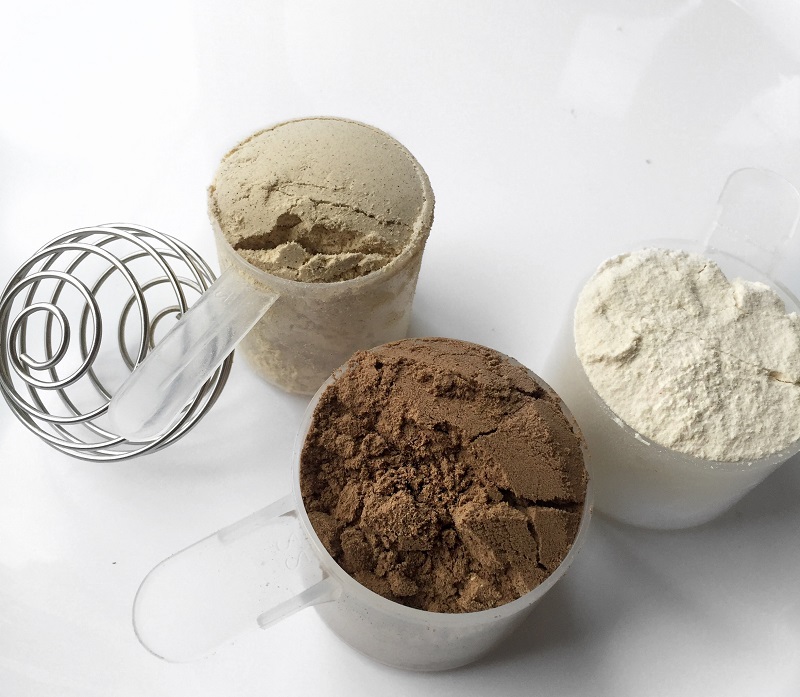
#5 Cottage Cheese
Another high protein option is cottage cheese. One serving usually has 25-plus grams of protein. It’s also low in fat, but does usually contain sodium, which is also good to replenish post-run.
You can get single serve cups that come with fruit or other mix-ins. Or you can make your own with fresh fruit you have on hand.
#6 Peanut Butter or Nut Butters
While peanut butter and nut butters don’t tend to be super high in protein, they’re still great spreads to have in your pantry. They are a great source of healthy fats, vitamins, and more.
To get some carbs, make a good ole PB&J, subbing in your favorite nut butter. Have some oatmeal and use a nut butter as one of your toppings, or keep PB2 on hand for a low fat, high protein addition to your smoothies. You could also use nut butter as a dip for fruit or a spread on crackers.
Checkout some of my favorite healthy almond butter recipes for more ideas>>
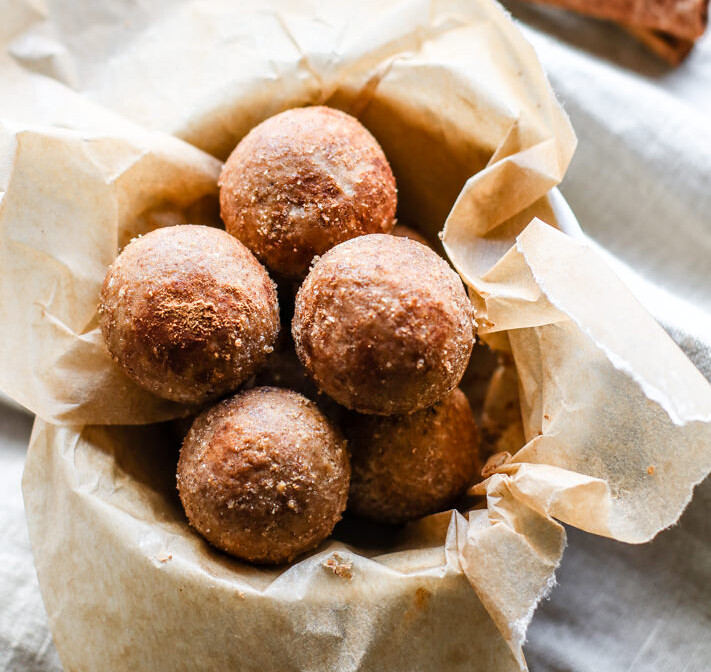
#7 Eggs
Eggs are another incredibly versatile food to keep on hand at all times. It’s also generally an affordable kitchen staple.
Start with the basics and simply scramble, fry, or poach them. Or get fancy and put them on top of avocado toast (P.S. avocados are another great source of potassium as well as healthy fats).
Make an omelet or a scramble and add in veggies like spinach, tomatoes, bell peppers, or even broccoli for some high quality carbs and top with cheese for a protein and calcium boost.
#8 Salmon, Sardines, or Chicken
We know not everyone is a seafood fan, so that’s why we also included chicken here. These foods would be a great option for when you’re finally feeling ready for that heavier meal a bit later.
Salmon is a great source of healthy fats, while both salmon and sardines are chock full of omega-3s, which are linked to a reduction in inflammation.
For those non-seafood folks, a tried and true lean protein is chicken. White meat or dark meat, it doesn’t matter. Add a side dish or two to any of these and you have a healthy, nutrient-dense recovery meal.
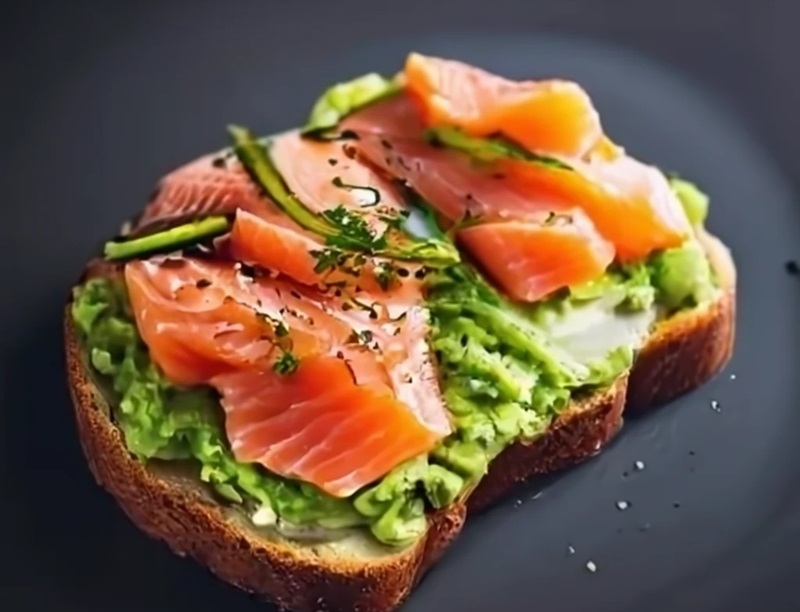
#9 Quinoa, Brown Rice, or Sweet Potatoes
Speaking of side dishes, besides a veggie, don’t forget a quality starch like quinoa, brown rice, or sweet potatoes.
Sweet potatoes have beta carotene, a valuable anti-oxidant, and also are a good source of vitamin A and iron. They’re really versatile too as they’re great baked or roasted on their own or they can even be used in a more dessert-like way.
Quinoa and brown rice are just additional starchy, high quality carbohydrate sources to continue helping your body on its recovery journey.
#10 Hydration
Ok I’m cheating a bit here, but hydration is SO IMPORTANT that I thought if I made it a food group you’re more likely to listen.
Post-run, it’s crucial to replace the fluids lost through sweat and facilitate the transport of nutrients to cells. The impact of dehydration on recovery cannot be overstated, as even mild dehydration can hinder the body’s ability to repair and rebuild.
Electrolytes play a vital role in maintaining fluid balance and muscle function. Sodium, potassium, magnesium, and calcium are key electrolytes that can be depleted through sweat. Replenishing these electrolytes is essential for preventing cramping, maintaining hydration levels, and supporting overall recovery.
Checkout my favorite electrolyte powders and electrolyte tablets for runners >>
What Foods to Avoid After Running?
While individual tolerance to foods can vary, there are certain types of foods that runners may want to avoid immediately after a run to support optimal recovery and minimize potential discomfort. It’s essential to keep in mind that individual responses to foods can differ, so pay attention to how your body reacts.
Here are some general types of foods that runners might consider avoiding:
- high-fat greasy meals may be hard to digest
- spicy foods
- excessive amounts of fiber (maybe not a great time for a massive plate of roasted veggies)
- post run beer isn’t bad, but isn’t really helping you either
Recognizing the role of recovery foods for runners is a massive step forward in your training. So kudos to you for being here and reading this! Onward to many more incredible days of running.
Looking for more training and nutrition?
Other ways to connect with Amanda
Instagram Daily Fun: RunToTheFinish
Facebook Community Chatter: RunToTheFinish
Sign Up to Receive a Weekly Newsletter with Top Running Tips and Laughs

